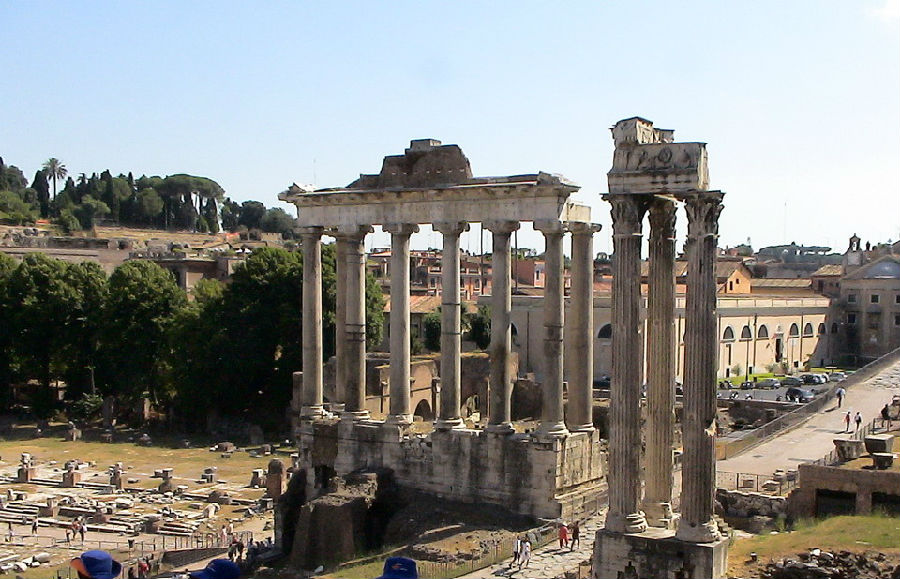Segment nine A: Introduction. Everything changes,
第九节 A 简介,所有事都在变化
and we change right along with everything.
我们也随着一起改变
In this exciting lecture, Rome will continue trying to
本课很精彩,罗马将会继续努力
deal with both the positive and negative consequences
解决作为地中海超级大国
of being the superpower of the Mediterranean world.
所带来的积极和消极的影响
The Romans had been reasonably familiar with the
罗马人一直都合情合理地对他们在
ancient Greeks they encountered in Italy. But when they
意大利遇到的古希腊人很熟悉
conquered Greece, it turns out, the Greeks in turn
但是当他们征服了希腊,结果却是
conquered the Romans, to use Horace's phrase.
希腊人反过来征服了罗马人,贺拉斯这样说

Like the Roman empire, the Roman government was a work
就像罗马帝国,罗马政府是一个
in progress,and not all of the progress was positive.As
还在进行中的工作,不是所有成果都是正面的
the Roman nation became more wealthy and more powerful,
随着罗马变得越来越富有和强大
so did individual Romans.The tension between the wealth
罗马人也是
and power of individual Romans and the practice of
富有强大的罗马人与民主实施之间的紧张关系
democracy would cause great problems down the line.
将在各个阶段引发很多的问题
In segment nine B: Romans and Hellenism, we take up the
第九节 B 罗马人与古希腊文化
Romans' love-hate relationship with the ancient Greeks.
我们继续讲罗马人对古希腊人又爱又恨的关系
After the conquest of Greece, Romans re-discovered
占领希腊以后,罗马人重新探索
Hellenism,the cosmopolitan Greek lifestyle developed in
古希腊文化这种世界性的希腊生活方式
classical mainland Greece and spread throughout the
它成形于古典希腊大陆,亚历山大大帝将其
Eastern Mediterranean by Alexander the Great.
传播到了东地中海
Hellenism opened up a new world of art, literature and
古希腊文化打开了艺术,文学的新大门
creature comforts far beyond what the mos maiorum
创造了远远超过祖制所规定的舒适
prescribed. The Romans would tend to look down their
罗马人倾向于看不起希腊人
nose at the Greeks for being soft and frivolous, and
认为他们软弱,毫无价值
unable to rule themselves effectively. Yet the Romans
无法有效地管理国家
wholeheartedly admired the Greeks'cultural achievements
但是罗马人真心地羡慕希腊人的文化成就
and adapted many Greek customs and Greek technologies
并接纳吸收了很多希腊习俗和希腊科技
for their own use and some they just took over outright
有一些他们还直接拿来用
The result was a truly Greco-Roman civilization which
结果是出现了真正地古希腊罗马文明
served as the foundation for, what we'll call, the Roman Empire.
它是罗马帝国的基础
In segment nine C: The Costs of Success,
第九节 C 成功的代价
Rome wrestles with the social costs of her success,
罗马与她成功的社会代价博弈着
most notably, the decline of Rome's former backbone,
主要指罗马以前中坚分子
the small farmer class. Killed off in Rome's wars or
小农阶级的衰落,死于罗马的战争
run off of their farms by agribusiness concerns
或者因为大庄园制的原因逃离农场
called latifundia, the former small farmers had nowhere
以前的小农无处可去
to run but the cities. This usually meant Rome.
只能逃往城市,一般都逃往罗马
Rome evolved politically during this time,
在这段时间罗马在政治上得到发展
but only in certain ways.
但只限于某些方面
Allowing the plebeians, wealthy plebeians, that is,
准许贫民,富有的平民
to hold political office and to marry patricians
获得一官半职并且准许他们与贵族通婚
was a positive change. The so-called noble class or
是积极的改变
nobilitas ,which sprang up from the mixture of classes
这些所谓的贵族阶级或者贵族来自混合阶级
brought needed fresh blood into Roman leadership.
为罗马的领导带来了所需的新鲜血液
But on the other hand, little, if anything,was done for
但是另一方面,他们并没有为城市中的穷人
the urban poor, even by those politicians who pretended
做些什么,甚至那些假装关心穷人
to care for their interests.The urban poor had little
利益的政治家也没有做什么
to look forward to and little hope of bettering their
城市中的穷人没有什么可期待的,生活能变得
lot in life.The same was true of Rome's Italian allies.
更好也没望,这对于罗马的意大利同盟也一样
The Italian allies were expected to contribute men and
罗马希望意大利同盟们为罗马的战争
money to Rome's war efforts, but because they were not
贡献男人与金钱,但是因为他们不是
citizens they got nothing in return.
公民所以他们什么回报都得不到
Segment nine D: Rise of Militarism explains what
第九节 D 军国主义抬头解释了
happened when Rome's growing empire required more
当罗马逐渐变为帝国,她需要越来越多的
and more soldiers, only to find the small farmer class was gone. For decades, the neglected small farmer class
战士,但她只发现小农阶级逃跑了的事实几十年来,被忽略的小农阶级
had been moving into the city, becoming poor and
不断涌向城市,变得贫穷
therefore becoming ineligible for military service.
所以不够资格参军












